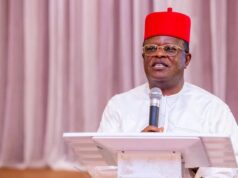The Federal government is considering a significant overhaul of its tax system, with plans to implement a 25% personal income tax rate for wealthy individuals earning ₦100 million or more monthly.
This proposal was unveiled by Taiwo Oyedele, Chairman of the Presidential Fiscal Policy and Tax Reforms Committee, during a breakout session at the 30th Nigeria Economic Summit in Abuja.
Oyedele highlighted the need for a more equitable tax structure, stating,
“If you earn N100m a month, we are taking up to 25 per cent from the rich people. That’s because we need to balance the books.”
He emphasized that the current tax system disproportionately burdens those who should be exempt, revealing that “almost 90 per cent of people who are paying taxes are those who should not have been paying in the first place.”
The proposed reforms aim to create a more balanced approach to taxation, easing the burden on lower and middle-income earners while ensuring higher contributions from the wealthy.
For individuals earning ₦1.5 million or less per month, the committee suggests reducing personal income tax obligations. Those with higher incomes would see gradual increases in their tax rates, potentially reaching the 25% mark for top earners.
Oyedele outlined plans to completely exempt lower-income earners from personal income tax, stating, “People will pay tax once we decide that they have to pay.”
He added, “97 per cent of the informal sector should be formally exempted from taxes. People do not understand where we are coming from. They’re not the ones to pay taxes. They’re just trying to survive.”
The reforms also address business taxation.
Oyedele announced plans to reduce the corporate income tax rate from 30% to 25%, describing this as a “huge” benefit for businesses. Additionally, the committee proposes changes to Value Added Tax (VAT) policies, including reductions or eliminations on essential goods and services such as food, health, education, accommodation, and transportation.
“Today, whatever VAT you (businesses) pay on assets—whether you’re building a factory, buying a laptop, or vehicles—you bear it. This increases your cost, and therefore, your pricing will go up. Once our reforms are implemented, you get the credit back 100 per cent on services and assets,” Oyedele explained.
The committee is also reviewing tax incentives and waivers, with Oyedele arguing that indiscriminate incentives can harm the economy.
He stated, “We cannot give all the incentives you are asking for. We think the biggest low-hanging fruit is removing these incentives, and that’s exactly what we are doing.”
The committee will review tax incentives and waivers, removing those that harm the economy.
To ensure accurate taxation, primary data identification channels will be utilized to bring the appropriate group of taxpayers into the tax bracket.
The proposed changes are expected to take effect from January 2025, pending passage of the bill by lawmakers. These reforms come amidst Nigeria’s economic challenges, including high inflation rates, which Oyedele notes has already acted as a “disorderly” tax on the population.




